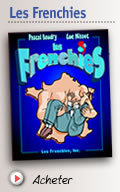Expatica
Wading to the Other Shore
'French and Americans, The Other Shore' offers up a psychological, read here weaning and toilet-training, explanation of that age-old question: 'Why are they like that?' Expatica France editor Clair Whitmer reviews this new exploration of familiar territory.
There is a long, not so noble expatriate tradition of sitting around citing the faults of one's hosts, that is, the people who populate the country where you live.
Here in France, the question that inevitably comes up in 'anglo-saxon' iterations of this conversation is this: why do they let their dogs poop all over their lovely country?
But I just finished a book that explains it: premature toilet-training. The answer is: the French are constantly searching to both please and rebel against a critical mother figure who demanded results (or other euphemism of your choice) too early.
Aaah. Well, if nothing else, having read this book, you'll never lack for a way to spark a conversation at a Franco-American cocktail party.
No, I'm not talking about 'A Year in the Merde', although the title of that other best-selling work was indeed inspired by the dog-poop question.
I'm talking about a serious, need I mention, Freudian? work of cross-cultural examination: 'French and Americans: The Other Shore' by Pascal Baudry. The original French version was published in 2000 online and in print in 2003; the English version was released in May of this year.
Baudry has lived in the US for 20 years and still lives there, in Silicon Valley, where can be found the largest cluster of French people in the States (outside New York City). And this book was really written for them, that is, French people living among Americans.
Baudry's subject is, quite explicitly, the French, and his goal is to reveal their own mindset to themselves, with Americans and American psychology brought in for purposes of comparison. (Specifically, while the French are suffering early trauma on the potty-training, Americans are weaned too early and spend the rest of our lives wondering if our mothers really loved us.)
And revealing it is. Some of the fundamental conclusions — French culture is implicit, American culture is explicit, the French sense of identity is tied to membership in groups while Americans are individualists — I had read elsewhere.
But Baudry here delves into the psychological underpinnings and has the professional credentials to make such an attempt credible.
Personal testimonial
I would never have dared to attribute any aspect of French behaviour to toilet-training, partly because I feel personally just a little uncomfortable with Freudian reductionism but mostly because, living here amongst French people, I just wouldn't dare.
His explanations made sense to me, however, mostly because, as one half of Franco-American couple who potty-trained my Franco-American daughter under my French mother-in-law's nose, I have personal exposure to the theories of child-rearing he discusses.
And here I mean on both sides of this equation: when Baudry talks about French mothers failing to psychologically wean their children and coddling them well past the time when they should be autonomous, I hear my mother-in-law whose most-quoted expression is still, to this day, with all her children in their 40s, "Ni fait, ni à faire."
This means, literally, 'neither done nor to do', but idiomatically, means 'Neither asked nor wanted.' The message is: I didn't ask you to do anything because you can't do anything right so it's better if you do nothing at all.
Baudry's book explained this to me.
At the same time, he talks about American mothers telling their children: "Go on, have fun, you can do it!" But what they really are saying is: "Get out there and do it yourself and you better learn to like it because you are on your own." Well, that's me, right there, mother-as-cheerleader: I use exactly these words to my children. Or I did, until I read this book and now couldn't say them without wincing a bit.
The book offered several such 'ah-ha' moments of clarity on conversations I had had with my husband and in-laws, although when I brought up Baudry's theories with them, purely as conversational fodder, the entire family was completely dismissive. Now my methods are suspect en famille both for being too American and because I cited the French shrink. Oh well.
It's a good thing I never got around to explaining to them Baudry's idea that French culture is intrinsically 'schizophrenic'.
Style v. substance
The other revealing part of Baudry's book is not just what he says but how he says it.
French authors who tackle the question of 'why are the French like that' tend to be academics; the other much cited example would be 'Cultural Misunderstandings' by anthropologist Raymonde Carroll.
Baudry's not humourless; his book jacket tells me he has given hundreds of conferences to American and French audiences "despite which he is still alive and well."
No, he's French: highly analytical, a trifle verbose, and with a tendency to name-drop, demonstrating his erudition by references to cultural figures and events that you're supposed to just get. This is partly because the translation fails to thoroughly anglicize some of the French constructions, which may not qualify as convoluted in French but do in English.
But mostly, it's just that this book demands your attention if you are to glean its value.
(One of the appendices, which, thankfully, you're not required to read to understand the rest, actually offers up mathematical formulae that purport to justify his conclusions. I'm sure it all adds up, but forgive me, I skipped the math.)
Plus, after some 200-plus thought-provoking pages, he comes right back around to that catch-all the French seem to always come back to sooner or later: ''French cultural genius".
So, he lost me at the very end. I'm not making fun, really. I just don't personally find that "Glory and Honour" explains much to me, just as Baudry predicts that an American would; it's a French thing and I just don't understand it.
But, then again, 'The Other Shore' was written for French people and apparently they do.
Perhaps I didn't make it all the way to the other shore, but I did get a lot out of this book that justified the effort it took, much more than just the dog-poop explanation, although I do expect to cite that for some time.
November 2005
Copyright Expatica
Source : http://www.expatica.com/source/site_article.asp?channel_id=4&story_id=25544



